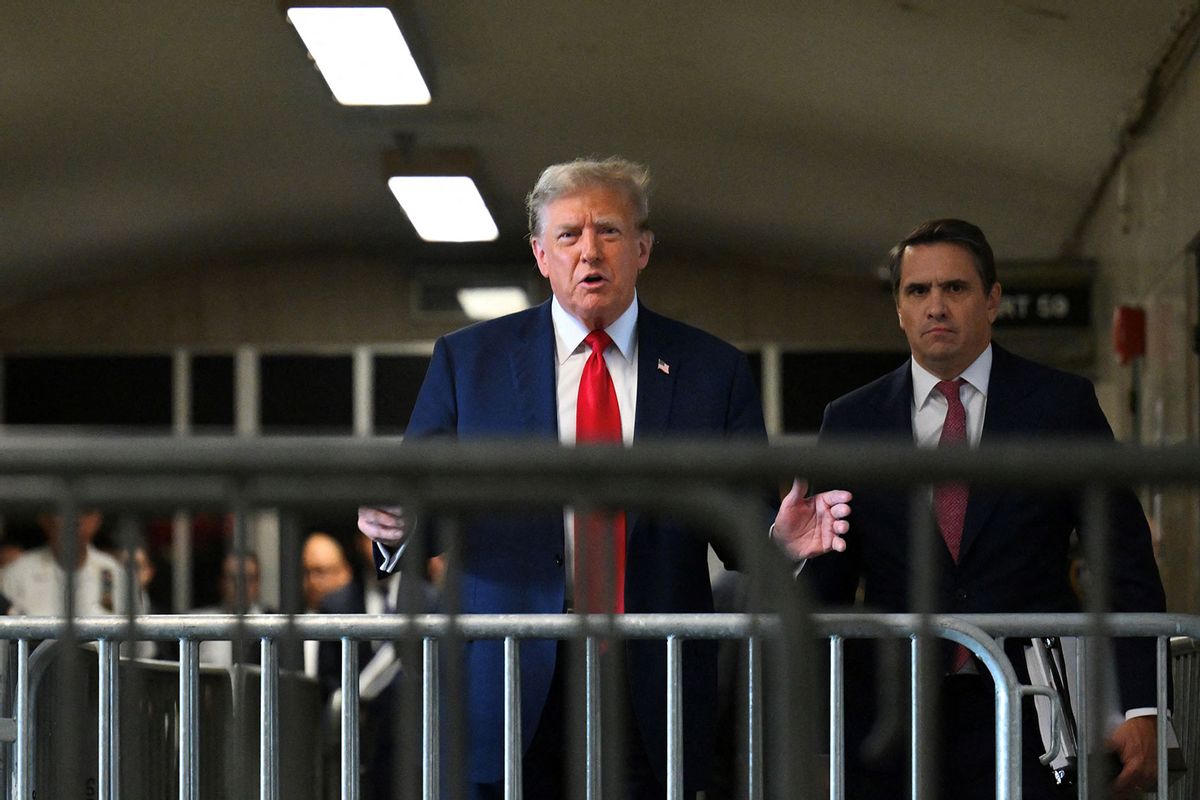Former President Donald Trump’s rants and whines may play well at a rally, where supporters are primed to cheer any word that journeys out of his mouth, but legal experts say the Republican nominee will only hurt his own case if he brings his petulant routine on the campaign trail to the inside of a Manhattan courtroom.
Trump, facing 34 felony counts related to the cover-up of an election “hush” payment to adult film star Stormy Daniels, has repeatedly tried and failed to push back his day in court. Now, though, with jury selection beginning Monday, Trump’s audience will include a judge whose family he has repeatedly attacked on Truth Social.
While the former president never did pivot to presidential behavior, his lawyers will have likely told him he should comport himself with dignity as a criminal defendant in the state of New York. His freedom could depend on it.
“I think he’s likely to face to face a sentence of incarceration if he’s convicted,” Norm Eisen, a senior fellow at the Brookings Institution, told USA Today.
That’s far from a given. Other experts say Trump’s lack of previous convictions could mean, if convicted, a sentence of probation – a sentence that would still be unprecedented and humiliating for someone who is seeking a return to the White House.
If Trump is convicted, and what kind of sentence he would receive if so, depends at least in part on whether he can behave himself. His social media attacks on Judge Juan Merchan – who would decide his sentence – already suggest that the courtroom setting, where his bullying tactics won’t be “liked” and reposted, could go badly for him.
"You start whining and making faces and pouting in front of the judge, what tends to happen in a trial is things stop going your way,” David Henderson, a trial attorney and MSNBC legal analyst, said over the weekend.
Writing for The Daily Beast, Ryan Brescia, an associate dean at Albany Law School, noted that Trump’s boorish behavior plays well with his fans but is unlikely to be viewed as reflecting innocence by a jury of his peers.
“Unlike in the court of public opinion, where Trump’s bluster and bullying may help win supporters and cause some to cower, when court is in session, the rules of evidence and procedure kick in,” Brescia wrote. “The same tactics that might give Trump some public relations wins do not really work in court. In fact, they often backfire.”
We need your help to stay independent
Trump has already shown himself more than capable of losing it at court. In January, during the second defamation lawsuit from writer E. Jean Carroll, Trump stormed out during closing arguments. “The record will reflect that Donald Trump just rose and walked out of the courtroom,” the judge noted. Trump was in turn found liable for defaming Carroll, again, after a jury earlier found him liable for sexually abusing her.
But some argue it won’t even get that far. That is, Trump’s fate could be sealed before he even gets the chance to act out.
“Jury selection is going to be the whole ball game,” Elie Mystal, a legal analyst at The Nation, said in a Sunday appearance on MSNBC. “All Trump needs is one cultist, one dyed-in-the-wool Trump supporter, to sneak into that jury,” Mystal said, arguing that such a juror could “hang the whole thing.”
To avoid that prospect, Judge Merchan will question prospective jurors on their political activities and whether they are members of any extremist organizations. Both sides will have an opportunity to disqualify people they do not want to see on the jury. After selection, however, it’s an open question how jurors will view not just Trump’s behavior during trial, but the credibility of those testifying against him, like former personal attorney Michael Cohen.
Want a daily wrap-up of all the news and commentary Salon has to offer? Subscribe to our morning newsletter, Crash Course.
Jennifer Rodgers, a former federal prosecutor, told CNN that while Trump could harm his own case with any in-court antics, he does indeed benefit, like any criminal defendant, from the fact that it only takes a single person on a jury to derail a conviction. Prosecutors “need 12 jurors unanimously to convict the former president,” Rodgers said, “whereas Trump only needs one juror to say they won’t convict to hang [it].”
But before a jury decides Trump’s fate, the trial itself will serve as a reminder of Trump’s character – that he is accused of cheating on his wife, with a porn star, just after she’d given birth – with voters reminded daily of just who he is. After nine years and an “Access Hollywood” tape in which he bragged about sexual assault, such reminders perhaps shouldn’t be necessary, but there’s no question that Trump and his campaign would prefer we talk about something else.
Unfortunately, for Trump’s team, this is but one of several cases where discussion of the former president’s criminality will be front and center, not just on cable news but inside a courtroom. After Manhattan District Attorney Alvin Bragg makes his case, special counsel Jack Smith will hope to make his in trials over Trump’s mishandling of classified national security documents and efforts to overturn the 2020 election.
But, while Trump has tried to downplay the importance of the Stormy Daniels case – how he is accused of having “falsified business records to conceal an agreement with others to unlawfully influence the 2016 presidential election,” as prospective jurors are being told – some argue it’s the perfect opening chapter.
“This case is an early chapter in the story of Trump’s willingness to cheat in elections and break the law in order to win,” Joyce Vance, a former U.S. attorney during the Obama administration, wrote Monday. “In that sense, it’s the most fitting place for prosecution to start.”



Shares